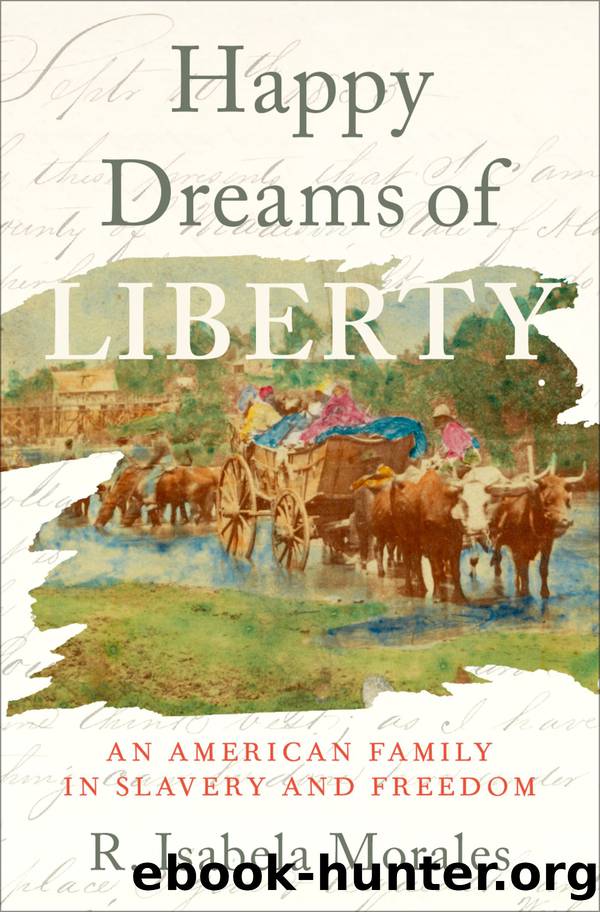Happy Dreams of Liberty by R. Isabela Morales

Author:R. Isabela Morales
Language: eng
Format: epub
Publisher: Oxford University Press
Published: 2022-08-15T00:00:00+00:00
The men on horseback wore disguises: black and red gowns that brushed their toes, conical paper hats eighteen inches tall, and cloth masks with holes for the eyes.83 Some of them displayed black devilsâ horns on their foreheads; others spoke through mouthpieces that distorted their voices. âThey said they came from hell,â one witness reported, âthat they died at Shiloh fight and Bull Run.â84 Looking diabolical in their robes and masks, the lost souls usually visited around midnight, circling their victimsâ houses and whistling for them to come out or, if that failed, firing a pistol through the window. In Madison County, they raided Black familiesâ homes for weapons and cash, taking âold blunderbusses,â revolvers, and whatever money the freedpeople had managed to save.85 They often targeted Black soldiers, men who had fought on the Union side and âtalked too much.â86 Other times, the victims simply had something they wantedâlike Joseph Gill, a farm laborer with a horse they considered too good for a former slave. âThey said they wanted him for a charger to ride to hell,â Gill said, but he knew better than that.87 This was no host of damned Confederate martyrs. This was Madison Countyâs Ku Klux Klan, and when they left Gill with two hundred lashes on his back and a bullet in his dog one night in 1868, they didnât ride to the underworld. They took the old Fayetteville road to Parks Townsendâs farm in Hazel Green.
Men like Edmund and Samuel Townsend had once ruled northern Alabama, their wealth and influence placing them at the top of the social orderâand granting them power to brutalize the enslaved population with impunity. Parks Townsendâs father had been present the day in 1848 when Edmund led a posse to a neighboring plantation and ordered an enslaved man whipped to the bone.88 Two decades later, âYoung Park,â as the locals called him, rode at the head of mob of his own, twenty-odd masked men terrorizing the former slaves who had made his familyâs fortune. Joseph Gill, born a slave, had labored on Parks and his motherâs farm just the year before.89 A new form of the old slave patrols, Klansmen across the South broke up freedpeopleâs election meetings and attacked Black schools and churches. They threatened, beat, and murderedâanything to disrupt the mobilization or empowerment of Black communities. They targeted Union veterans, Freedmenâs Bureau agents, Republican officeholders, farmers, teachers, tenants, or any African American with a modicum of self-sufficiency. Like Parks, they were the sons of once-great slaveholders, soured by the planter aristocracyâs fall; they were bankrupted white farmers, resentful of competition from a free Black labor force; they were ex-Confederate soldiers, enraged by the sight of Black men at the polls. In central Alabamaâs Black Belt and other regions where freedpeople made up large majorities and could better defend themselves, vigilante attacks were less common. But in northern Alabama, with its smaller, more dispersed Black population, the Ku Klux Klan waged a war of violence and terror without restraint.
Download
This site does not store any files on its server. We only index and link to content provided by other sites. Please contact the content providers to delete copyright contents if any and email us, we'll remove relevant links or contents immediately.
american english file 1 student book 3rd edition by Unknown(616)
Phoenicians among Others: Why Migrants Mattered in the Ancient Mediterranean by Denise Demetriou(612)
Verus Israel: Study of the Relations Between Christians and Jews in the Roman Empire, AD 135-425 by Marcel Simon(595)
Caesar Rules: The Emperor in the Changing Roman World (c. 50 BC â AD 565) by Olivier Hekster(582)
Basic japanese A grammar and workbook by Unknown(580)
Europe, Strategy and Armed Forces by Sven Biscop Jo Coelmont(523)
Give Me Liberty, Seventh Edition by Foner Eric & DuVal Kathleen & McGirr Lisa(500)
Banned in the U.S.A. : A Reference Guide to Book Censorship in Schools and Public Libraries by Herbert N. Foerstel(492)
The Roman World 44 BC-AD 180 by Martin Goodman(479)
Reading Colonial Japan by Mason Michele;Lee Helen;(471)
DS001-THE MAN OF BRONZE by J.R.A(467)
Introducing Christian Ethics by Samuel Wells and Ben Quash with Rebekah Eklund(464)
The Dangerous Life and Ideas of Diogenes the Cynic by Jean-Manuel Roubineau(458)
Imperial Rome AD 193 - 284 by Ando Clifford(457)
The Oxford History of World War II by Richard Overy(456)
Catiline by Henrik Ibsen--Delphi Classics (Illustrated) by Henrik Ibsen(441)
Language Hacking Mandarin by Benny Lewis & Dr. Licheng Gu(413)
Literary Mathematics by Michael Gavin;(409)
Brand by Henrik Ibsen--Delphi Classics (Illustrated) by Henrik Ibsen(399)
